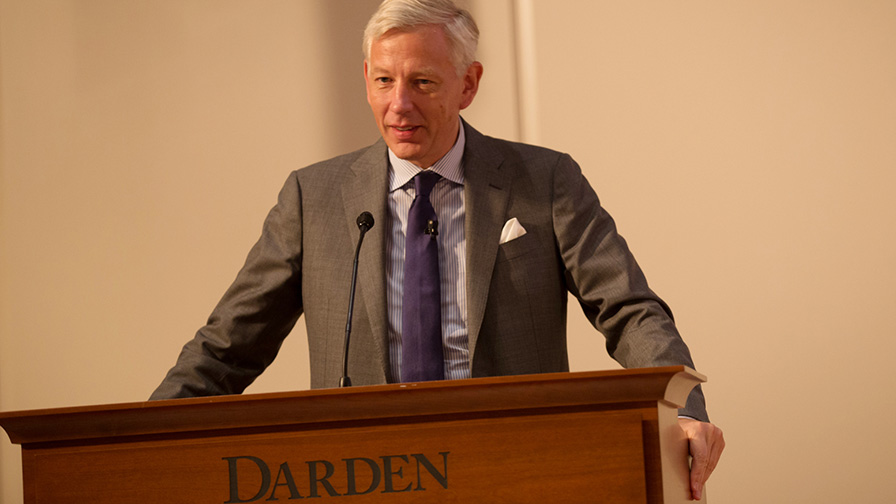
McKinsey’s Dominic Barton Sees Global Disruption, Opportunity in Rapidly Changing World
By Dave Hendrick
As the world enters a period of rapid transformation, traditional conceptions of leadership may need to evolve, as well.
Speaking at the University of Virginia Darden School of Business at a Leadership Speaker Series event, McKinsey & Co. Global Managing Partner Dominic Barton predicted that the next 10 to 15 years would be an “extraordinarily unique” time period in global history, as massive global trends such as shifts in economic power and accelerating technological change fundamentally challenge and remake existing views of the world.
Barton told Darden MBA students that they were being groomed to lead in a world without historical precedent, with a rapidly expanding middle class in places like China and parts of Africa, and with ongoing urbanization that will lead to 414 cities in emerging markets fueling half of the global gross domestic product by 2025.
“Think about the relationships that you are building in these parts of the world, because they are going to matter big time,” Barton said.
In an era reshaped by demographic shifts and technological breakthroughs, both opportunity and economic dislocation will continue for countries, their citizens and corporations.
As just one example of the intense disruption brought about, in part, by technological innovations, Barton noted that the companies on the Standard& Poor’s 500 Index in 2015 had a 15-year average lifecycle, as opposed to a 90-year lifecycle among the companies in the same index in 1935. It’s a reminder for any company, be it General Motors or McKinsey, that there is no right to exist and thrive in a competitive and dynamic marketplace, Barton said.
The companies that will have the best chance of longevity are the ones led by truly forward-thinking leaders, those with ambition and an outlook that may stretch out decades.
The role of business in society, too, may be at an inflection point. Barton said business leaders will need to be truly involved in their communities and engaged in the major policy issues of the day.
The McKinsey leader maintains a key interest in the study of leadership, and said he actively seeks out heads of state and CEOs for interviews when traveling — ideally two per day.
Barton put his interview tally at more than 1,700 high-level leaders.
“A lot of what we were taught about leadership in the last 10 years, I don’t believe is relevant or as relevant as what we are going to need to be taught … as we think about the next 10 to 15 years,” Barton said, adding that understanding leadership via the careful study of what leaders do — aligning an organization or setting goals — should take a backseat to a more fundamental measurement.
“I think, increasingly, the most important factor of a leader is who you are versus what you do,” Barton said, adding that “who you are” was also a learned property, or a muscle that could be strengthened.
In addition to honing a long-term, or “telescope” perspective, Barton said other key traits included the ability to prioritize and compartmentalize; manage energy as opposed to time; be purpose-driven; and develop the key traits of selflessness, decisiveness and resiliency, among others.
“It’s an exciting time, and it’s going to take a lot of leadership,” Barton said, declaring himself “jealous” of the opportunities that lay before the students.
The University of Virginia Darden School of Business prepares responsible global leaders through unparalleled transformational learning experiences. Darden’s graduate degree programs (MBA, MSBA and Ph.D.) and Executive Education & Lifelong Learning programs offered by the Darden School Foundation set the stage for a lifetime of career advancement and impact. Darden’s top-ranked faculty, renowned for teaching excellence, inspires and shapes modern business leadership worldwide through research, thought leadership and business publishing. Darden has Grounds in Charlottesville, Virginia, and the Washington, D.C., area and a global community that includes 18,000 alumni in 90 countries. Darden was established in 1955 at the University of Virginia, a top public university founded by Thomas Jefferson in 1819 in Charlottesville, Virginia.
Press Contact
Molly Mitchell
Senior Associate Director, Editorial and Media Relations
Darden School of Business
University of Virginia
MitchellM@darden.virginia.edu




